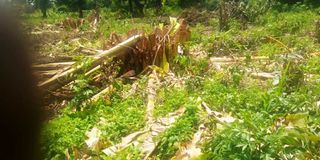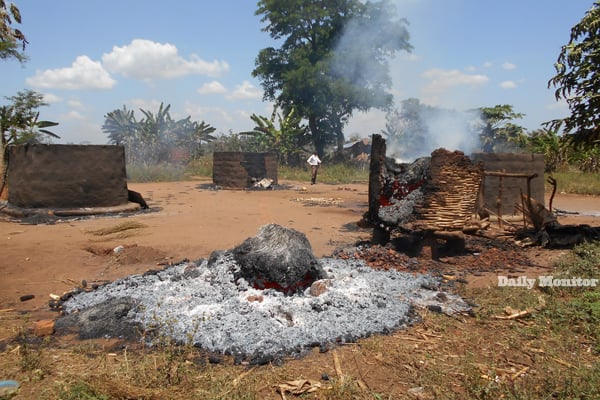Prime
NFA evicts 100 households from disputed land in Kole

A banana plantation which was cut down during the eviction in Ilera Parish, Kole District. Inset is Mr Martin Odongo, the lead petitioner. PHOTO PATRICK EBONG
What you need to know:
Affected residents accuse the forest authority of disregarding the court order that halts evictions until the main suit is disposed of
More than 100 households have been left homeless after they were forcibly evicted by the National Forestry Authority (NFA) from a 391-acre piece of land in Kole District.
The disputed land covers Bung, Okabo and Lela villages in Ilera Parish in Ayer Sub-county.
The government agency allocated the land to private tree planters.
Residents allege that the eviction was done in disregard of a temporary court injunction instituted by the High Court in Lira in 2019.
The court had restrained the forestry body or its agents from carrying out any evictions until the main suit is disposed of.
The NFA maintains that the affected households encroached on a forest reserve, which was gazetted in 1958 by the British colonial administration.
In her affidavit seen by this publication, Ms Jacqueline Namuddu, a lawyer from the NFA legal department, said residents allegedly encroached on the forest reserve.
Boundaries redemarcation
She said in 2018, a series of meetings were held with local leaders and it was agreed that the boundary of Ilera Central Forest Reserve be redemarcated.
“In 2019, boundary opening was done, the central forestry reserve was demarcated and pillars were planted in the presence of all concerned local leaders and community members, and the pillars are still in place,” Ms Namuddu said.
“The central forestry reserve was thereafter allocated to private tree planters who have so far planted three and a half out of the four blocks constituting the central forest reserve,” she added.
Ms Namuddu also said it is unlawful for any person to occupy, graze, cultivate, cut, damage, destroy or do any other activity in a forest reserve unless such a reserve has been degazetted.
She requested the court not to grant an injunction in favour of the applicants.
“I am aware that not every person who files a civil suit in court is entitled to a grant of a temporary injunction,” Ms Namuddu said.
“The application is brought in bad faith; to block the respondent (NFA) from exercising its mandate under the law and leave the reserve and trees planted by private tree planters at the mercy of the applicants,” the NFA legal officer added.
When contacted to comment on the matter, the NFA communications manager, Ms Juliet Kamuli, referred us to Mr Jimmy Owuna, the NFA manager for Lango and Acholi sub-regions.
Attempts to reach Mr Owuno were futile as he did not pick our repeated calls on his known phone number.
However, Mr Martin Odongo, 84, one of the evictees, who said he was born on the contested land in 1938, said the place has never been a forest reserve.
“No forest has ever existed there apart from the natural forest which has since been depleted by the occupants,” he told this newspaper.
According to Mr Odongo, NFA started evicting them from the land in 2004, but some residents resisted the eviction.
In May 2019, the NFA Apac sector manager only identified as Mr Olal together with Kole security committee members met the community for a dialogue over the land issue.
Mr Odongo said no agreement was reached, and later, the NFA started erecting mark stones on boundaries which they said is central forest reserve.
Dissatisfied by the process of land demarcation, Mr Odongo together with other applicants, Mr John Ongora, Mr Samuel Bua, Mr Patrick Omoko, and Mr Robert Kennedy Ogal, sought court intervention in 2019.
But after making the locus visit to the contested land, Justice Godfrey Ssalaamu Ngobi, the assistant registrar of the High Court in Lira in his ruling on February 22 ordered that the status quo of the suit be maintained.
“An order of temporary injunction do issue restraining the respondent, its agents, workmen, and successors from evicting the applicants from their residential and farming land, cutting down and/or destroying the applicants’ trees and crops planted on the disputed land and interfering with the status quo in any way until the final disposal of the main suit,” he ruled.
Activities on land banned
The court also ordered that the applicants be restrained from damaging and cutting trees planted by the respondent as marked out in the map.
Mr Odongo, who is the lead petitioner, however, alleged after the temporary injunction was served to all the parties on February 24, unidentified NFA officials deployed soldiers on the disputed land the following day.
The said officials, according to Mr Odongo, were in the company of the area LCII chairperson, the Ayer Gombolola Internal Security Officer (GISO), and the officer-in-charge of Apii Police Outpost.
He said the locals upon seeing the guests got excited and kept gathering where the soldiers had packed their vehicles and a motorcycle.
“The locals thought there was an issue which the soldiers might address. A lieutenant briefly addressed the people, telling them that the issue is still in the court but nobody will carry out any cultivation on the land,” Mr Odongo said.
He said since February 26, the soldiers have been deployed on the land.
“They have put a small military detach at the home of a woman where a s lieutenant said he will be operating both day and night from that command post until there is no one on the government land,” Mr Odongo said.
Parliament’s take
The Northern Youth MP, Mr Boniface Okot, raised the matter on the floor of Parliament on April 14. Mr Okot said livelihoods have been disrupted and citizens mistreated following the evictions.
“The eviction is characterised by torture of the citizens, destruction of crops, houses and animals; they do not have access to water or their farmland,” Mr Okot said.
In response, the Speaker of Parliament, Ms Anita Among, directed the Minister for Security, Mr Jim Muhwezi, to protect residents being illegally evicted.
Ms Among tasked the minister to ensure that peace prevails in the area.
“There was a presidential directive which was ensuring that people should not be evicted from such areas. The ministry needs to make sure that people stay in their homes peacefully. Those cases of women being raped must stop,” Ms Among said.




